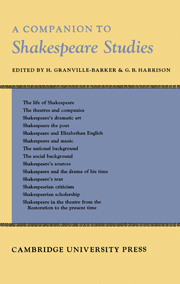Book contents
- Frontmatter
- Contents
- ILLUSTRATIONS
- Preface
- The Life of Shakespeare
- The Theatres and Companies
- Shakespeare's Dramatic Art
- Shakespeare the Poet
- Shakespeare and Elizabethan English
- Shakespeare and Music
- The National Background
- The Social Background
- Shakespeare's Sources
- Shakespeare and the Drama of his Time
- Shakespeare's Text
- Shakespearian Criticism
- Shakespearian Scholarship
- Shakespeare in the Theatre from the Restoration to the Present Time
- Reading List
- Appendices
- Index
- Plate section
Shakespeare the Poet
Published online by Cambridge University Press: 05 August 2012
- Frontmatter
- Contents
- ILLUSTRATIONS
- Preface
- The Life of Shakespeare
- The Theatres and Companies
- Shakespeare's Dramatic Art
- Shakespeare the Poet
- Shakespeare and Elizabethan English
- Shakespeare and Music
- The National Background
- The Social Background
- Shakespeare's Sources
- Shakespeare and the Drama of his Time
- Shakespeare's Text
- Shakespearian Criticism
- Shakespearian Scholarship
- Shakespeare in the Theatre from the Restoration to the Present Time
- Reading List
- Appendices
- Index
- Plate section
Summary
One of the three books I have with me is Shakespeare's Poems: I never found so many beauties in the Sonnets–they seem to be full of fine things said unintentionally–in the intensity of working out conceits.
Letter of Keats, November 22nd, 1817.It may perhaps be doubted whether even he did not sometimes give scope to his faculty of expression to the prejudice of a higher poetic duty.
Matthew Arnold, Preface to Poems, 1853.FROM POET TO DRAMATIST
Shakespeare was a poet before he was a dramatist. To say this is not merely to remind ourselves that he composed the narrative version of the Venus and Adonis theme before his dramatic version of the no less popular story of Titus Andronicus. The Venus and Adonis belongs to the same date as Titus and I Henry VI (if these are Shakespeare's, as I believe), and, although there have been fewer to love than to praise the poem, no one would deny that it is in its kind a finished work of art, and the two dramas the essays of an apprentice.
The question is not only how the poet was transformed into the dramatist. Poetic drama, like opera, is a peculiar genre commonly composed of warring elements, and one must ask oneself where poetry ends and drama begins. What distinguishes narrative from dramatic blank verse, dramatic speech from rhetoric, lyrical imagery from rhetorical tropes?
- Type
- Chapter
- Information
- Companion to Shakespeare Studies , pp. 89 - 116Publisher: Cambridge University PressPrint publication year: 1934



